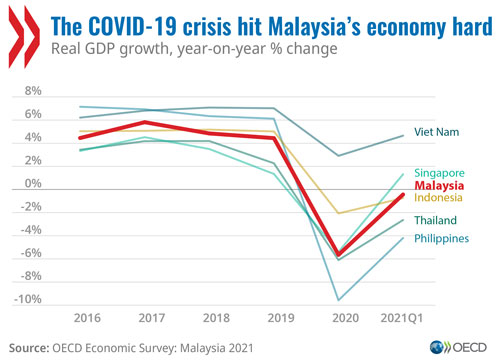12/08/2021 – The Malaysian economy is on the road to recovery from COVID-19, although risks remain from the ongoing crisis. A return, over time, to pre-pandemic growth rates will require continued reforms to improve the business environment further, and accelerate digitalisation, according to a new OECD report.
The OECD’s third Economic Survey of Malaysia says high unemployment in the wake of the crisis poses a challenge, along with weak productivity growth. In the short-term, accelerating the vaccination programme is crucial. Policy support for people and firms should continue until the recovery is well-established. Malaysia should then resume its pre-pandemic efforts to boost productivity by easing regulatory and administrative burdens and accelerating firms’ adoption of digital technologies.
Over the medium-term, a fiscal consolidation strategy will be vital to reduce public debt and prepare for growing health and economic costs from Malaysia’s ageing population.
“Malaysia is a business-friendly country, which attracts large flows of foreign direct investment and is well-integrated in global value chains. Nonetheless, further reforms to ease regulation and expand the digital economy will be essential to drive growth in the post-pandemic world and to ensure Malaysia fully benefits from today’s digital opportunities,” OECD Secretary-General Mathias Cormann said, presenting the Survey alongside Malaysia’s Minister in the Prime Minister’s Department for Economic Affairs, Mustapa Mohamed. (Read the full speech).
Malaysia was experiencing solid growth prior to the pandemic. With sales of electronic and health-related goods bouncing back, and policy support propping up domestic demand, the Survey projects GDP growth to rebound to 4.3% in 2021 and 6.1% in 2022, following a drop in economic activity of 5.6% in 2020.
 The economic blow from COVID-19 hit small firms and young, self-employed and migrant workers hard. Persisting high unemployment underscores the need to improve social protection and policy support for those not adequately covered, including many independent employees working for online platforms, and the micro-, small- and medium-sized businesses that account for a significant part of Malaysia’s economy.
The economic blow from COVID-19 hit small firms and young, self-employed and migrant workers hard. Persisting high unemployment underscores the need to improve social protection and policy support for those not adequately covered, including many independent employees working for online platforms, and the micro-, small- and medium-sized businesses that account for a significant part of Malaysia’s economy.
Prior to the pandemic, Malaysia undertook a series of reforms to improve the business environment, including by streamlining regulations and administrative burdens for businesses, and establishing competition authorities. While Malaysia now ranks well compared to its Southeast Asian peers, there is room to reduce barriers to competition further, particularly in the energy and transport sectors, professional services and retail, where the OECD’s Product Market Regulation indicators show that regulations and procedures remain restrictive relative to OECD countries.
The Survey also recommends accelerating Malaysia’s digital transformation by improving digital infrastructure, developing workers’ Internet skills and encouraging small firms – particularly older ones – to adopt new technologies that can stimulate innovation.
See a Survey Overview with key findings and charts (this link can be used in media articles).
For further information, journalists are invited to contact the OECD Media Office (+33 1 45 24 97 00).
Working with over 100 countries, the OECD is a global policy forum that promotes policies to preserve individual liberty and improve the economic and social well-being of people around the world.
Follow this news feed: OECD - Global





